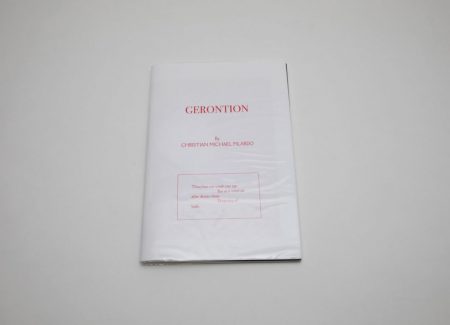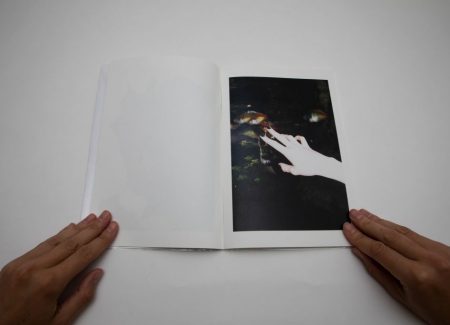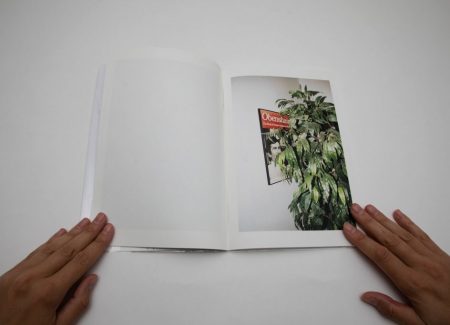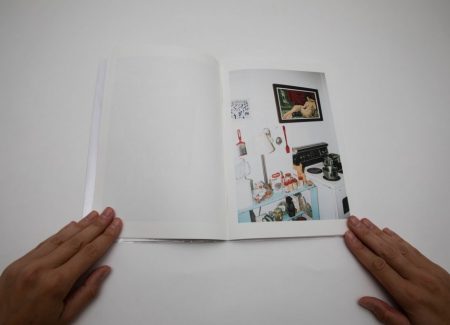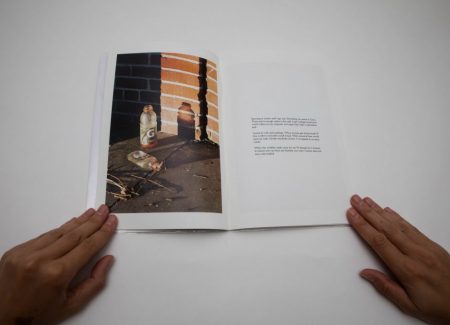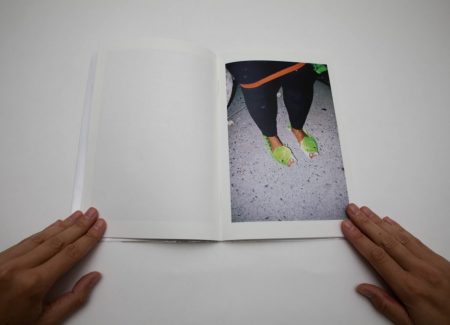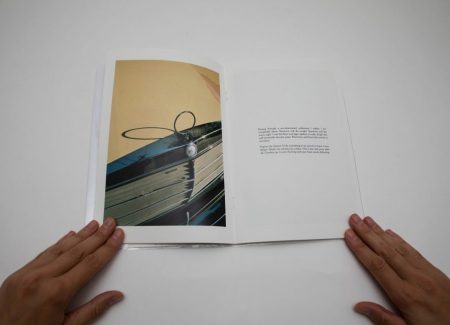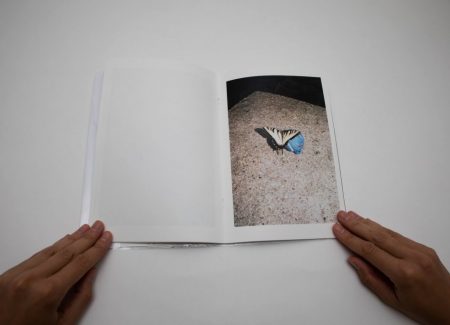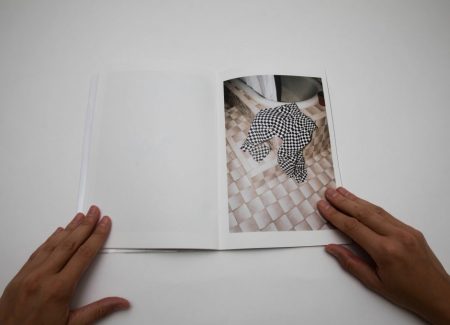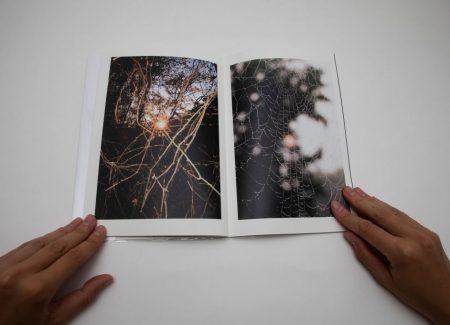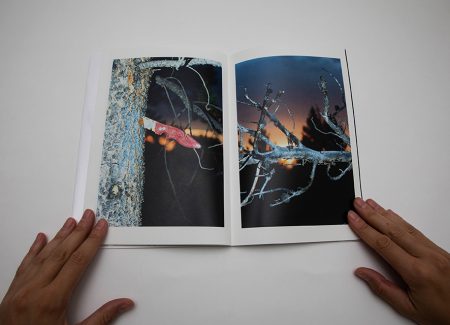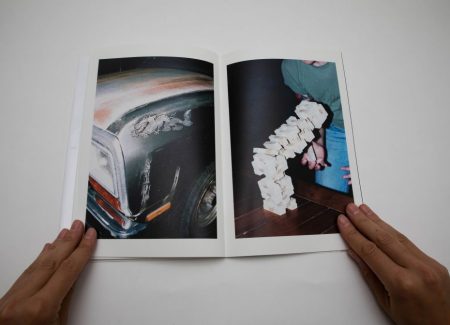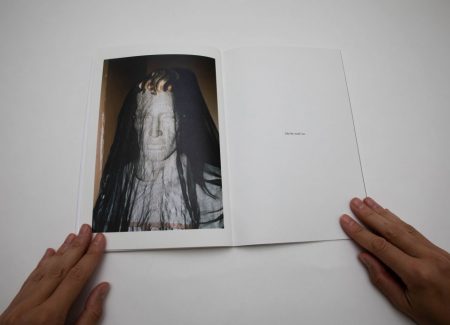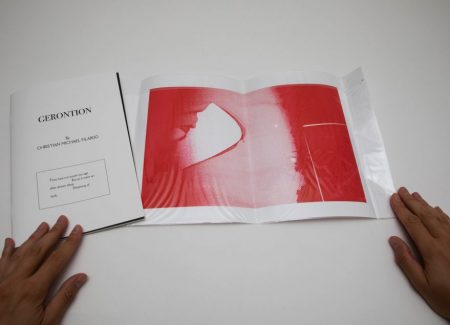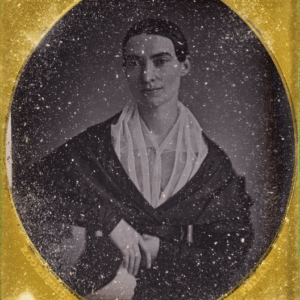JTF (just the facts): Published by Dianne Weinthal (self-published) in 2019 (here). Softcover, removable jacket with interior risograph print, 60 pages, with 34 color and black and white photographs. Includes 5 poems. In an edition of 200. Designed by Dianne Weinthal. (Cover and spread shots below.)
Comments/Context: Christian Michael Filardo, a Filipino-American artist, carries around his 35mm film camera and takes his inspiration from everyday life, easily finding excitement in trivial objects and quiet surroundings. As an artist, he sees photography as his primary medium, but his practice often combines writing, videography, and music. Filardo’s earlier photobook The Voyeur’s Gambit (reviewed here) combined images with musical compositions, encouraging intersections and connections between visuals and sounds, and his new book mixes imagery and text, pairing a stream of pictures with five poems.
The title of Filardo’s book, Gerontion, refers to a poem by T. S. Eliot, first published in 1920. The poem is the monologue of an elderly man (“gerontion” means “little old man”) as he reflects about the darkness and beauty in his life, with the state of Europe in the post-war period as an underlying context and touching on the topics of religion, the loss of sexuality, and the struggles of aging. The poem resonated with Filardo as he was moving from New Mexico to Virginia, and his photobook is an homage to it – Filardo looks at life around him with an attentive and mindful eye, as if trying to take it all in before it is too late.
Gerontion is a comfortably-sized vertically-oriented photobook, a pleasant one to hold and browse. The title and the artist’s name, along with the opening epigraph from the poem, appear in red on the white dust jacket, and the text on the cover and inside uses a Bodoni font, adding a slightly romantic feel. The interior of the jacket reveals a risograph print showing a ripped net against the sky (also in red) – it is both a nod towards his “typical “punk” approach to art making” and an introduction of the visual theme of tearing. The book is signed on the inside of the cover, and along with the signature and date, Filardo recorded his age, “age 27”, as a thoughtful and playful connection to T. S. Eliot’s poem.
The book opens with a photograph that looks like golden light reflected in water in the shape of stars against a black background, capturing the magic of a fleeting moment. Bright flash, saturated colors, and the straightforward isolation of a central subject create a sense of commonality across Filardo’s images, with the context of the T.S. Eliot poem offering themes and moods that recall the perspective of the elderly man. A hand reaches for the unreachable (fish behind the glass of a fish tank), and a fragile tower collapses (from the game Jenga). Other pictures reach back to fading memories or glory days (a gold watch on a windowsill, a Mercedes-Benz hood ornament in the afternoon sun, a dragon decal on the side of an old ragged truck), while still others look closely at leftovers and discarded remnants (a group of plastic bottles and their long shadows, and a checkerboard-patterned towel left on tiled stairs). Even the sunsets feel deliberately wistful, with craggy branches interrupting the last moments of orange sunlight.
The melancholy mood lightens a bit when Filardo turns to found oddities, like fish-shaped flip flops, a butterfly perched on a blue tennis ball, or the visual echo of a spiderweb. Often mundane and quiet, the photographs are sharp and thoughtful observations of the surrounding world, where moments of personal reflection move between darkness and soft light.
The poems included in the book collect diaristic reflections on life and its passing moments. An image capturing a bed and a picture window framing the forest outside (perhaps it is in a country house) is paired with a poem, part of which reads: “Silhouettes danced on the asphalt. Humid evening heavy heart, I’ll miss them forever and ever. Green greener, yellow yellower, red less red but still pretty red. This tree is just a postcard that I could send them if I felt like letting them remember me.” Filardo’s words add a sense of personal intimacy, as if we are witnessing an internal conversation he is having with himself.
Gerontion is an unpretentious and subtly elegant publication, one that functions as both a visual diary and an active engagement with the themes that run through Eliot’s poem. It quietly wrestles with the anxieties and doubts of aging, filtering the moods of a quarter-life crisis through the fictional vantage point of one much older. It delivers a dreamy and marvelously attentive look at the mundane around us, reminding us that a pause to look around often offers personal resonances hiding in plain sight.
Collector’s POV: Christian Michael Filardo does not appear to have gallery representation at this time. As a result, collectors interested in following up should likely connect directly with the artist via his website (linked in the sidebar).
